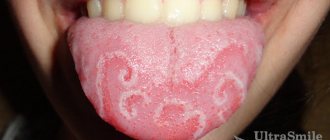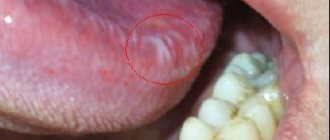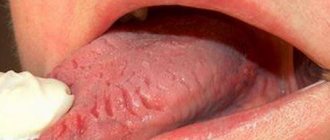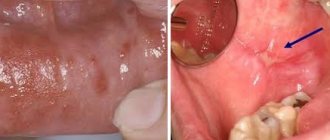Everyone has had to deal with minor tongue burns at least once. But it also happens that a person becomes hurt, even if he did not burn anything. There are several reasons why the tip of the tongue hurts, as if it were burned, and they need to be treated differently . It is best to immediately consult a doctor and cure the underlying disease, but if you want to understand the problem yourself, it is advisable to start by identifying the possible causes of the pain.
Burning tongue. Possible reasons
The causes may be congenital or acquired, associated with infections, intoxications, injuries to the nervous system and disorders of its blood supply, psychogenic, caused by a lack of vitamin PP in intestinal diseases.
A burning sensation of the tongue is often observed with arthrosis of the temporomandibular joint.
Glossalgia can occur with malocclusion, with sharp edges of teeth and dentures, fillings and dentures made of different metals, after traumatic tooth extraction.
Burning syndrome in the mouth is observed in chronic gastritis with secretory insufficiency (reduced gastric secretion), intestinal diseases (enteritis, colitis), and diseases of the liver and biliary tract. Treating these conditions can significantly reduce burning mouth syndrome.
Most often, this syndrome is observed in women aged 50–60 years. The main signs of burning mouth syndrome are the following sensations:
- tingling,
- tingling,
- pressure,
- numbness,
- burning tongue,
In this case, there is a coating on the surface of the tongue and dry mouth.
How to treat a burning tongue sensation
The first thing to do if pain in the tongue occurs is to consult a specialist. It is advisable to go to a therapist, and not to a dentist, as many do. It is extremely rare that pain in the tongue area indicates problems with oral health. You should only go to the dentist if a burning sensation occurs after dental treatment, or if other symptoms indicating dental problems are observed at the same time.
Usually, an examination and anamnesis are sufficient to identify the root cause of an unpleasant symptom. Only in rare cases is it necessary to do additional tests.
When the clinical picture becomes clear, the doctor will prescribe treatment. The speech organ itself is usually not given special attention; treatment should be aimed at eliminating the cause of the sensation of a burned tongue :
- In case of fungal or infectious infection, antibiotics are prescribed. In addition to these, the specialist selects products that protect the natural microflora of the oral cavity.
- For serious stomach problems, not only drug therapy is prescribed, but also a diet. In rare cases, hospitalization is required.
- The most difficult thing is the treatment of neurological diseases. When they are identified, the intervention of several doctors and serious therapy are required.
In all other cases, burning in the mouth can be eliminated through proper nutrition and giving up bad habits. In addition, you need to avoid stress and pay attention to oral hygiene.
Diagnosis of glossalgia
These sensations can appear at any time of the day, often intensify in the evening, and rarely occur at night. These manifestations may be for no apparent reason, or may occur or intensify after irritating food, the burning sensation may completely disappear while eating non-irritating food. This is an important diagnostic sign of the syndrome.
Burning sensations may be accompanied by swelling of the tongue with tooth marks along its edges, small cracks in the tongue, mild soreness of the tongue and taste disturbances often occur.
Patients may have neuropsychiatric disorders: disorders of the autonomic nervous system in the form of increased heart rate (tachycardia), sweating, pale skin, increased tendon reflexes, obsessive-compulsive neurosis, depression, etc.
The patient is advised to consult specialists: dentist, neurologist, gastroenterologist to exclude glossitis (inflammation of the tongue caused by infection, chemical irritant, injury to the tongue, allergies) and B12 and folic anemia, which causes burning and pain of the tongue with its characteristic changes: bright red, smooth and a shiny (varnished) tongue.
Glossodynia - what is it?
Burning mouth syndrome, or glossodynia, is discomfort and even pain in the mouth, tongue, gums, and mucous membranes, which is accompanied by a feeling that the mouth has been scalded with boiling water or medicine. This condition may be accompanied by dry mouth (xerostomia) and loss of taste or smell. Sometimes people with a burning sensation in the mouth and tongue complain that they cannot feel anything - not even the temperature of the food [1].
This condition develops suddenly, but may begin with a slight tingling sensation in a limited area of the mouth, and then spread further or intensify only in that same area. Symptoms of this condition are described by subjective complaints; they can be combined or single:
- feeling of burned mucous membranes, burning pain. Most often, a burning sensation in the oral cavity is felt on the tongue, especially along its front edge and sides, as well as on the lips, on the inside of the cheeks, in the throat or throughout the mouth;
- a feeling of tightness, burning and dryness of the mucous membrane in the mouth, from severe to occasional;
- change in taste, up to the complete loss of this sensation;
- the appearance of an unusual taste in food and drinks, such as bitterness or metallic;
- decreased or loss of sense of smell;
- a feeling that sensitivity in the mouth has disappeared, the mouth seems to be frozen [2].
Symptoms of burning the oral mucosa can manifest themselves in different ways throughout the day over several days and even months. Sometimes they begin at a certain time of the day, for example after waking up, and by the end of the day they decrease or, conversely, intensify in order to disappear imperceptibly and return again in the morning. The subjective characteristics of pain associated with burning mouth syndrome can vary significantly. Among people with similar diseases and other life factors and conditions, the symptoms of this condition, their intensity, duration and prevalence can vary greatly [2].
Separately, it should be noted the great social and personal significance of glossopyrosis. The fact is that sensations in this state can affect the quality of life in all its aspects: nutrition, sleep, rest and restoration of physical strength, communication, reactions to some irritants. Those suffering from constant pain cannot get enough sleep or rest peacefully; they have difficulty eating and communicating. In an attempt to find the source of the problem and somehow eliminate it, they begin to pay a lot of attention to this condition. Thus, many note that with the appearance of glossopyrosis, spots have formed in their mouth, the papillae have enlarged, or the tongue has begun to look unusual. As practical observations have shown, in 50% or more cases such changes are actually normal, are in no way related to burning mouth syndrome, and the person had them before, he just didn’t notice them [2].
This is very important for diagnosis, because the appearance of some real clinical signs, obvious manifestations of trouble may indicate that burning mouth syndrome did not arise on its own, it is not idiopathic, but there are some problems, prerequisites for its occurrence [3].
Treatment of burning sensation in the mouth
Therapeutic nutrition, exclusion of spicy and irritating foods.
- After consultation with a dentist, elimination of foci of pathological impulses in the oral cavity from the dentofacial system.
- Normalization of the tone of the autonomic nervous system:
- preparations of valerian, motherwort, bellataminal, etc.,
- tissue metabolism stimulants - courses of B vitamins (B1, B6, B12),
- nootropic drugs, depending on the nature of the neuropsychic disorders (tranquilizers, antidepressants and other drugs that improve blood supply to the brain and oral tissues). The course of treatment must be carried out after consultation with a neurologist.
- Local remedies: applications to the tongue of a 2% novocaine solution, 10% lidocaine solution, rinsing with propolis, herbal infusion.
- In some cases, physiotherapy is used - electrophoresis on the solar plexus and cervical autonomic nodes, hirudotherapy from a specialist.
How to get rid of pain at home
Some of the reasons why your tongue feels sore, feels like it's burned, and has a white coating on it indicate poor hygiene. In this case, to eliminate unpleasant symptoms, it is enough to regularly clean the oral cavity of food debris and bacteria. If discomfort does not go away after a few days, consult a doctor.
To relieve symptoms at home, you can resort to the following traditional methods of therapy:
- Use homemade antiseptic rinses to prevent infection. Such manipulations will be useful regardless of why the tongue began to hurt.
- If you are sure that you did not burn yourself, but the discomfort does not go away, rinse your mouth with a soothing infusion of chamomile or sage. In pharmacies you can even find special solutions for sensitive gums, which also relieve pain.
- If you feel the burning sensation is too strong, you can take a pain reliever. If you are pregnant, you should first consult your doctor.
- Drink more water, weak tea. During therapy, avoid soda and juices. Try to eliminate white sugar from your diet.
- Lollipops with mild flavors relieve discomfort. But if you abuse them, you can damage the mucous membrane of the mouth and tongue.
There were very few ways to get rid of discomfort similar to a tongue burn. In almost all cases, you will have to go to a specialist to find out how to treat the root cause of the pathology.
Causes of Burning Mouth Syndrome
This condition may be associated with any general somatic or dental disease, or it may occur on its own. As a rule, burning mouth syndrome is a condition in which its source is unknown. It occurs spontaneously, and the patient cannot indicate the cause or trigger for the complaint.
There are several theories about the development of this pathology, but none of them have yet been proven. Researchers of this problem have made several assumptions as a theory of the origin of the syndrome. One of the most common is the theory of sex hormone deficiency, since complaints of chronic burning of the tongue are often made by pre- or postmenopausal women. True, when checking studies in this area, reliable statistical significance was not established, but, nevertheless, as a theory, this reason is supported by many practitioners [3].
“Among patients with burning mouth syndrome, women were more common. According to some studies, there were 10.3 times more women with complaints typical of this condition than men.”
Saperkin N.V., Ph.D., Associate Professor of the Department of Epidemiology, Microbiology and Evidence-Based Medicine PIMU [1]
There is an assumption that certain autoimmune processes, especially those that occur in old age, may also be background for the occurrence of burning mouth syndrome [2].
It is possible that this disease occurs in people with neurological or mental disorders, depression. But this is also not the leading theory, since there are studies indicating that it was not depression that led to the onset of the syndrome, but on the contrary, burning mouth syndrome became one of the reasons for the development of a depressive episode. The same spectrum of causes of burning in the mouth includes cancerophobia, especially in people who have quit smoking and are afraid of developing cancer of the lip or tongue, as well as in people with a fear of household transmission of STDs [2].
Injuries can lead to the syndrome, including those not noticed by a person, associated with his habits, congenital or due to pathologies with malocclusion, dental anomalies. Some researchers note that individual changes in the sensitivity and density of the oral mucosa can lead to the development of glossopyrosis. A correlation has been noted between mental lability and increased sensitivity of taste buds: in such people, the incidence of burning mouth syndrome was higher. In general, the approximate list of conditions and diseases in which the syndrome may appear is quite wide [3].
- In women, there is a deficiency of estrogen or progesterone.
- Autoimmune pathology.
- Neurological disorders, PTSD.
- Psychiatric disorders.
- Chronic irritation of the mouth, such as from improper dentures.
- Sensory defects.
Diseases that may cause a burning sensation in the mouth:
- Anemia.
- Parkinson's disease.
- Deficiency of B vitamins, zinc.
- Neuropathy.
- Hypothyroidism.
- Taking medications.
- Diabetes mellitus type 2.
- Sjögren's syndrome with xerostomia.
- Candidiasis of the oral mucosa, esophagus.
- Herpes.
- Cracked tongue.
- Allergies, including contact ones.
- Hiatal hernia.
- HIV.
- Myeloma.
- Oncological diseases [3].










